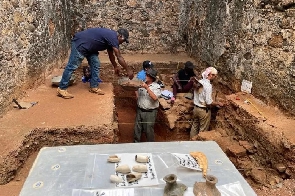Ghana is at the center of the world’s spotlight again after news broke, confirming that the story of slavery on the continent of Africa, specifically begun in Ghana.
Working together with a team, an archaeologist, Prof. Christopher DeCorse, has led a team of archaeologists in uncovering the exact location of what is thought to be the first English slave fort in Africa.
Buried under the ruins of Fort Amsterdam, the professor from Syracuse University in the United States of America, led and directed the team as they carefully, expertly extracted remains of an older fort, Kormantine.
The long-lost fort, buried under the earth, has the archaeologists busy, as they methodically comb through layers of distinct layers of soil, the BBC reports.
From the ruins, the team is discovering and laying out a gunflint (used in old-fashioned guns), tobacco pipes, broken pottery, and the jawbone of a goat, which all point to the existence of “the first English outpost established anywhere in Africa.”
According to Prof. Chritopher DeCorse, “Any archaeologist who says they are not excited when they find something are not being entirely truthful," and it is with this excitement that he announced this pivotal moment in the history of the involvement of Europeans in Africa during the slave trade era.
The discovery by the team of archaeologists may shed some light on the lives of those early traders and what they were doing, as well as those who were sold and the impact on the community around them.
According to the report, the slave trade began in this location (Fort Kormantine) in 1663 when King Charles II granted a charter to the Company of Royal Adventurers of England Trading into Africa (later the Royal African Company). He gave it monopoly rights over the trade in human beings.
Two years after, however, the Dutch seized the fort, but that has not taken away the fact that Fort Kormantine played a key role in the initial stages of the slave trade.
"We don't have that many details on exactly what these early outposts of the slave trade looked like, which is one of the things that make uncovering the foundations of Fort Kormantine interesting," Prof DeCorse added.
Click here to read the full BBC report
AE/WA
Click to view details



General News of Tuesday, 1 August 2023
Source: www.ghanaweb.com

















